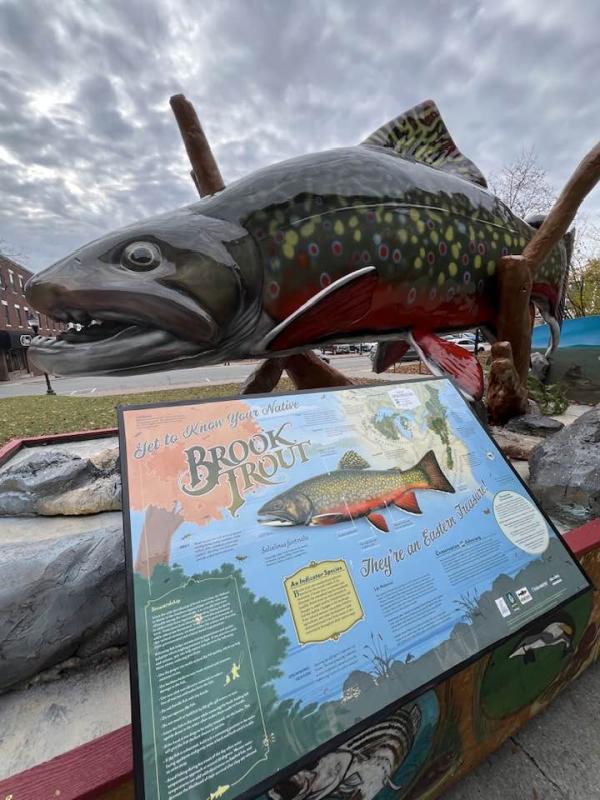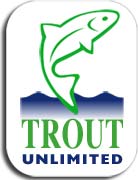Downeast TU is a chapter of Trout Unlimited, a national non-profit organization dedicated to protect and conserve North American cold-water fish species and habitat. Membership is open to all, go to www.tu.org/join305Downeast and use chapter code 305 Downeast TU.
Monthly meetings are the Fourth Wednesday of the month from October to May at the Moore Center, 125 State Street, Ellsworth, ME
Register To |
|

 gmail.com (joeyrizzoart[at]gmail[dot]com). Rizzo’s art can be seen at https://fineartamerica.com/
gmail.com (joeyrizzoart[at]gmail[dot]com). Rizzo’s art can be seen at https://fineartamerica.com/#ChanceSculpture #JoeyRizzoArt #BangorPublicLibrary #Downeast TU #Trout Unlimited #DowntownBangor #ArtoberBangor
https://downtownbangor.com/
Slim’s Fishing Derby Weigh in at Toddy Pond. Contact Jesse Larabee 207-348-6133. More Ice fishing derbies can be found all over Maine. Tip- Jigging works for many species and can keep novice anglers engaged on a slow day. You never know what the fish might be looking for so experiment with different lures, colors and speeds. Maine IFW Fisheries Biologists share update’s in the Fishing Report: mefishwildlife.com/
The 2026 fishing law book is here, and full of fishing opportunity in Maine's 6,000 lakes and ponds and more than 32,000 miles of rivers and streams. Make this your year to catch lifelong memories, delicious fish, and reconnect with the Maine outdoors.
View Maine's 2026 inland fishing laws and rules:
· Online at mefishwildlife.com/laws
· Download the PDF: 2026 Maine Fishing Laws (PDF)
· Use the map-based display of special fishing laws, FLOAT! FLOAT can be found on our website, but is faster to find when using the app.
Reminders: Never dump your bait into the water when you are done for the day. Dispose of it on land or in the trash to avoid introducing new species or diseases harmful to the fishery and ecosystem. Check conditions before heading out, avoid areas near flowing water, and let someone know where you'll be and when you should return.
2026 Salmon Egg Planting- Join Maine DMR crew in the field for planting Atlantic salmon eggs in the Sheepscot and Sandy Rivers this season. The link below will bring you to a form with two spreadsheets (one for each river), listing trip date and the number of volunteers needed. Please fill in your name, phone number and e-mail for trip specific details. Trips run into afternoon and are subject to change based on the weather, flows, and egg development.
Sheepscot River trip Feb. 19: Crews will meet at the parking lot across from Hussey’s in Windsor or Tobey’s parking lot in Palermo at 8:30am.
Sandy River trips: Crews will meet at the park and ride next to Walgreen’s in Farmington at 8:30am. Trips begin in February, also March 3, 11 and 12.
Contact Jennifer Noll 207-592-2402 or at Jennifer.B.Noll maine.gov (Jennifer[dot]B[dot]Noll[at]maine[dot]gov) . Bring chest waders, snowshoes, polarized glasses, many layers, a change of clothes, a lunch and plenty of water.
maine.gov (Jennifer[dot]B[dot]Noll[at]maine[dot]gov) . Bring chest waders, snowshoes, polarized glasses, many layers, a change of clothes, a lunch and plenty of water.
Fry Stocking Maine DMR has asked our chapter for volunteers to help them release Atlantic Salmon fry this spring in the Downeast SHRU. The fry stocking occurs in May and stocking dates will be sent out at that time. Stocking days are subject to change on short notice due to weather, hence the need for a large a pool of volunteers to ensure people are available to help. The stocking is done by hand with 5 gallon buckets. Volunteers will need to have waders or hip boots and be able to carry their bucket into the river and wade upstream, pouring out fry at suitable locations. The distances normally are not long and fry are released in shallow water. DMR is planning a class on safety and fry stocking in April. For more information or to volunteer contact Rob Packie (207) 610-0976 or at rbpackie gmail.com (rbpackie[at]gmail[dot]com).
gmail.com (rbpackie[at]gmail[dot]com).
Maine Riverscape Restoration Network 2026 Lunch & Learn A series of webinars covering river restoration science on Thursdays at noon in February and March. Email maine.river.restoration.network gmail.com (maine.river.restoration.
gmail.com (maine.river.restoration.
Maine Sustainability & Water Conference March 26 Augusta Civic Center-Registration now open for researchers, regulators, and citizens interested in Maine's environmental future. More information can be found on the University of Maine's Mitchell Center website. Early registration $70 ends March 6.
The State of Maine Sportsman's Show March 27th -29th Augusta Civic Center KVTU & GRTU will have a table and offer fly-tying in the Kids Zone.
TU Volunteer Hours for April 1 2025 to March 31 2026 due April 15 We must file an Annual Activity Report in order to receive member rebates from TU National. Logging your hours helps DETU with fundraising. Remember, your volunteer time begins the minute you step out of your home or office to travel to a meeting or event. Categories:
Communications & Engagement: Attending chapter meetings, writing newsletters, emails, maintaining website and social media, hosting non-conservation events that build community - such as fishing trips, chapter gatherings, fly tying or fishing classes, etc.
Advocacy / Lobbying: submitting testimony to the legislature, writing letters to the editor, supporting national advocacy campaigns, attending public hearings etc.
Conservation & Science: restoration or reconnection projects, water quality studies, insect sampling, temperature monitoring, etc.
Fundraising: planning and hosting in-person and online fundraising activities.
Veterans Services: Project Healing Waters, planning and participating in activities for the military and first responder communities.
Youth Education: Trout Camp, kids fishing days, school and non-school based youth programs and activities such as Trout or Salmon in a Classroom.
Contact Tammy Packie at tpackie gmail.com (tpackie[at]gmail[dot]com) for a sample worksheet. Submit hours to Art Benson at ajbrx
gmail.com (tpackie[at]gmail[dot]com) for a sample worksheet. Submit hours to Art Benson at ajbrx yahoo.com (ajbrx[at]yahoo[dot]com)
yahoo.com (ajbrx[at]yahoo[dot]com)
Maine TU Trout Camp June 14-18 Application Deadline April 1 We are seeking 2 people ages 13-17 who would like to attend this excellent learning experience at Evergreens Campground in Solon on the Kennebec River.. Trout Camp builds tomorrow’s conservation leaders, giving teens a foundation in biology, entomology, and sustainability, all while having fun. Cost for tuition, room & board is $800; a $200 deposit is due upon acceptance. Contact DETU Education Coordinator Mike Elkavitch melkavitch gmail.com (melkavitch[at]gmail[dot]com) for information. Applications are available on the Maine TU State Council website. https://www.tumaine.org/index.
gmail.com (melkavitch[at]gmail[dot]com) for information. Applications are available on the Maine TU State Council website. https://www.tumaine.org/index.
DETU welcomes the new Maine TU Field Technician, Zane Townsend. He will be leading the large wood crew and assisting Lauren Pickford, Maine TU Project Manager, with many projects across the state. Zane served three years on active duty as an infantryman in the U.S. Army and is currently in his tenth year as a combat engineer in the Army Reserve. He began his fisheries career at Southern Maine Community College, where he conducted eDNA research on brown trout and earned an A.S. degree in Marine Science. He is currently wrapping up a B.S. degree in Environmental Science at the University of Southern Maine, with a focus on water quality and ecology.
A life-long Mainer, Zane spent his early childhood years living in Rangeley, before moving to Buxton. He continued returning to Rangeley for vacations throughout his childhood, building a strong connection to Maine’s coldwater fisheries. Introduced to fishing at a young age by his father, his interest in fishing grew into a commitment to conserving aquatic resources. In the summer of 2025, Zane joined Trout Unlimited as a seasonal Habitat Technician; his strong leadership skills led to his current role supporting coldwater fisheries restoration across Maine.
TU Northeast Regional Rendezvous April 10-12 2026 Roscoe NY TU Rendezvous are weekends packed with fun, fishing, and hands-on conservation activities. Meet and mingle with TU staff, scientists,,and volunteers from across the country to network, make lifelong friends and fishing buddies. Share ideas for how we can grow TU’s efforts to support fisheries, cold, clean waters and communities.
Project Healing Waters Fly Fishing PHWFF is dedicated to the physical and emotional health of disabled active and veteran military personnel. Rehabilitation is through fly fishing activities, education, and outings. Enjoy camaraderie with fellow veterans at two locations in Downeast Maine; meet at the DSF Hatchery in East Machias on the 2nd Thursday of the month from 6-8pm, and at a new location at the Moore Community Center in Ellsworth on the 3rd Wednesday of the month from 6-8pm. To learn more visit https:// projecthealingwaters.org (mike.manning@
projecthealingwaters.org (mike.manning@
DETU Fundraiser A raffle with 3 prizes: First prize- West Branch Pond Camps Cabin for Two on June 12-14 2026. One of the oldest camps in Maine, this is a great place to fish, bird, or relax in peace and solitude in the woods. We thank Eric Stirling for his support. Second prize- $100 LL Bean Gift Card, third prize a half dozen Maine lobsters. Lobsters will need to be picked up. Tickets are $10 each or 3 for $25. Drawing April 22 at our Annual Meeting. Proceeds to benefit our youth education programs and habitat conservation projects. Contact Al West for information at aldime04658 gmail.com (aldime04658[at]gmail[dot]com).
gmail.com (aldime04658[at]gmail[dot]com).
State of Dam Removals in the US American Rivers March 18 1pm This webinar will highlight projects completed in 2025 and illustrate how dam removals are restoring rivers, reconnecting watersheds, and addressing public safety concerns. American Rivers maintains the nation’s most comprehensive database of completed dam removals, with more than 2,200 projects nationwide https://americanrivers-org.
2,500 ‘high-risk’ U.S. dams are sinking into the ground Popular Science Dec. 17, 2025, https://www.popsci.com/
Future Speakers & Activities
March 25 Emily Zimmermann, Maine DEP Triennial Review & Salmon Habitat Program
April 22 Annual Meeting, Spring Raffle Drawing Rising Trout Award. Speaker-Dan McCaw Penobscot Nation, Restoration on the Penobscot River
April 25 DSF Smelt Fry
May 9 Card Brook Clean Up
May 16 Union River Summit
May 27 Jacob Scoville Maine IFW **In person only at Helen’s in Machias.
June 13 & 14 Casting Competition at the Pleasant River Fish & Game Conservation Association
TBD-Narraguagus River Clean Up
Downeast Trout Unlimited Gear: Hats $25, Brook Trout pins $20, Brook Trout Earrings $16.
Downeast Trout Unlimited (DETU) is dedicated to conserving, protecting, and restoring Maine's cold water fisheries and their watersheds. For membership renewal call 800-834-2419. For NEW memberships go to www.tu.org/join305Downeast.
Mail donations to Downeast Trout Unlimited c/o Arthur Benson Treasurer, 32 Cottage Way Hampden ME 04444. If you have more equipment than you need please consider donating it to help DETU raise money for our conservation and education programs. Please Like & Follow Downeast TU on Facebook or visit https://www.downeasttu.org

